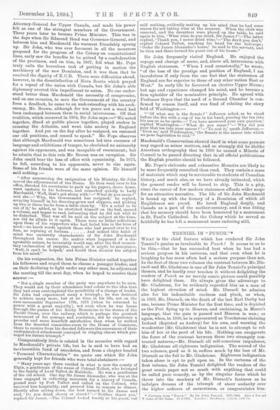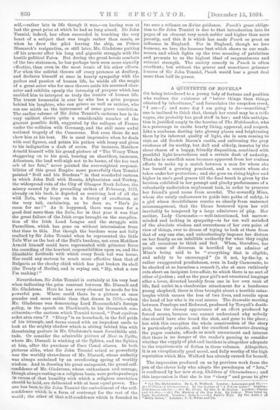TENNIEL IN "PUNCH"* WHAT is the chief feature which has
rendered Sir John Tenniel's genius so invaluable to Punch? It seems to us to be this,—that he has succeeded best when he has had a serious purpose in his cartoons, and that even when he is laughing he has more often had a serious purpose than not.
In the first of these two volumes the contrast between Mr. Dis- raeli and Mr. Gladstone is one of Sir John Tenniel's principal themes, and he hardly ever touches it without delighting the readers of Punch as no merely comic picture could possibly have delighted them. He always gives the advantage to Mr. Gladstone, for he evidently regarded him as a man of the highest elevation of mind. Mr. Disraeli he admires also for his indomitable coolness and pluck, as when, in. 1800, Mr. Disraeli, on the death of the last Earl Derby but one, became Prime Minister for the first time, and is depicted as the Pen i flying up to Heaven, and exclaiming, in lloore's language, that the gate is passed and Heaven is won ; or again, when, in 1880, he is represented as Touchstone claiming Ireland (depicted as Audrey) for his own, and warning the woodcutter (Mr. Gladstone) that he is not to attempt to rob him of her at the peril of his life. Nothing can exaggerate the force of the contrast between these two strangely con- treated natures,—Mr. Disraeli all self-conscious impudence, Mr. Gladstone all righteous indignation. The second of the two volumes, good as it is, suffers much by the loss of Mr. Disraeli as the foil to Mr. Gladstone. Righteous indignation taken alone is apt to pall upon us. In the cartoons of the first volume, Sir John Tenniel delighted the readers of the great comic paper not so much with anything that could be called pure comedy, as by the singular force which he threw into the mockery of Mr. Disraeli's features as he indulges dreams of the triumph of sheer audacity over the higher ardours of earnestness, or congratulates him- - • Cartoons from, "Punch." By Sir John Tutuila 1871-1881. Also a Soo ,nd Vt lunto of the Same. 18,2-1801. London Bradbury, Agnew, end 0o. self,—rather late in life though it was,—on having won at last the great prize at which he had so long aimed. Sir John Tenniel, indeed, has often succeeded in touching the very heart of a subject that was tragic rather than comic, as when he drew the pilot leaving the ship, on Prince Bismarck's resignation, or still later, Mr. Gladstone putting off his armour after his long and gigantic struggle with the hostile political Fates. But during the great heroic combats of the two statesmen, he has perhaps been even more signally effective, than even in the most ironic of his other efforts. For when the satirist throws off every pretence at drollery, and declares himself at once in hearty sympathy with the pathos and passion of human life, he wields all the magic of a great actor who for once throws aside his assumed char- acter and exhibits openly the intensity of purpose which has enabled him to interpret so truly the ironies of human life. The truest humourist is ever he who has a grim purpose behind his laughter, who can grieve as well as satirise, who can use mirth as the instrument of some grave conviction. The earlier volume of Sir John Tenniel's cartoons has in its very earliest sheets quite a considerable number of the gravest possible drift, suggested by the collapse of France under the collision with Germany, and the still more awful national tragedy of the Commune. But even these do not show him at his best. He is most impressive when be deals with real figures, and points his pathos with irony and gives to his indignation a dash of scorn. For instance, Matthew Arnold himself with his grand picture of "The Weary Titan staggering on to his goal, bearing on shoulders, immense, Atlantean, the load well-nigh not to be borne, of the too vast orb of her fate," never painted the overweighted responsi- bilities of this great Empire more powerfully than Tenniel painted "Bull and his Burdens" in that Wonderful cartoon in which John Bull with Russia, Afghanistan and Turkey, the widespread ruin of the City of Glasgow Bank failure, the misery caused by the prevailing strikes of February, 1879, already on his back, is depicted as receiving last of all the wild Zulu, who leaps on in a frenzy of exultation at the very tail, exclaiming, as he does so, Dar's jis room for me!" As it happened, there was room for a good deal more than the Zulu, for in that year it was that the great failure of the Irish crops brouglit on the complica- tion of the Irish Land League and the struggle with Parnellistn, which has gone on without intermission from that time to this. But though the burdens were not fully realised by Sir John Tenniel when he represented the little Zulu War as the last of the Bull's burdens, not even Matthew Arnold himself could have represented with grimmer force the crowding of the heaviest responsibilities upon us, and the illimitable fortitude with which every fresh toil was borne. Nor could any cartoon be much more effective than that of Bulgaria as the cheeky chick which has just broken its shell (the Treaty of Berlin), and is crying out, "My, what a row I'm making!"
Nevertheless, Sir John Tenniel is certainly at his very best when indicating the grim contrast between Mr. Disraeli and Mr. Gladstone. Here he has every element he needs for his powerful pen. Where could there be a picture at once grander and more satiric than that drawn in 1878,—when Mr. Gladstone was denouncing Lord Beaconsfield's foreign policy, in the speech on Blackheath, to his Greenwich con. btituents,—the cartoon which Tenniel termed, "Post equitem sedet atra aura"? "Dizzy" is on horseback, in the full pride of his triumph, and turns round with an impudent smile to look at the mighty shadow which is sitting behind him with threatening gesture in Mr. Gladstone's most formidable atti- tude. Or consider the admirable picture of illosh in Egitto, where Mr. Disraeli is winking at the Sphinx, and the Sphinx at him, after the purchase of Suez Canal shares. In both pictures alike, what Sir John Tenniel seized so powerfully was the worldly shrewdness of Mr. Disraeli, whose audacity was always sustained by an overflowing spring of worldly wisdom. And in drawing his great antagonist, the grand self. confidence of Mr. Gladstone, whose enthusiasm and courage, though always resting on a religious basis, were perhaps always in excess of that humility with which a religious conviction should be held, are delineated with at least equal power. The one has been to Sir John Tenniel the embodiment of the self- confidence which is a form of contempt for the rest of the world ; the other of that self-confidence whioh is founded in too sure a reliance on divine guidance. Punch's great obliga- tion to Sir John Tenniel is due to that introduction into its pages of an element very much nobler and higher than mere jocosity, and this it is which has made Punch so great an influence in England. For in England, though we love humour, we love the humour best which shows us our weak- nesses, and which lights up the true meaning of patriotism and presents to us the highest ideal of magnanimous and reticent strength. The society comedy in Punch is often excellent ; but without the graver and sometimes grimmer lessons of Sir John Tenniel, Punch would lose a great deal more than half its power.









































 Previous page
Previous page